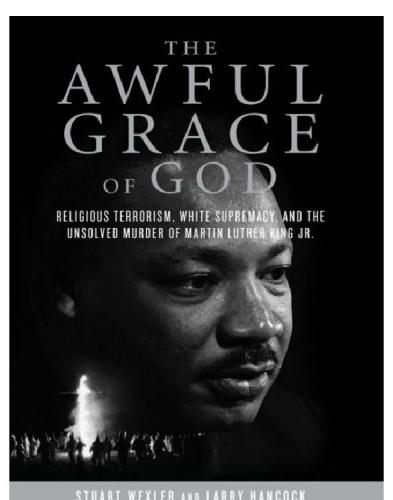
The Awful Grace of God
Religious Terrorism, White Supremacy, and the Unsolved Murder of Martin Luther King, Jr.
کتاب های مرتبط
- اطلاعات
- نقد و بررسی
- دیدگاه کاربران
نقد و بررسی

April 15, 2012
Martin Luther King Jr.'s assassination on April 4, 1968, resulted from widespread conspiracy led by religious terrorists J.B. Stoner, head of the National States Rights Party, and Samuel Bowers, Imperial Wizard of the White Knights of the Ku Klux Klan of Mississippi. So claims Wexler, a high school teacher, and Hancock, a historical researcher. These leaders and their followers believed King's murder would ignite a race war that would result in the elimination of blacks and Jews. The authors consulted newly declassified law-enforcement files of the King assassination and conducted interviews with people close to the events, notably Donald Nissen, an alleged bagman who held the $100,000 that James Earl Ray was to receive for killing King. The boldest assertions are that Ray, although a racist, killed King solely for the money and that his killing of King in Memphis was a spontaneous decision, not part of the original plan. VERDICT This chilling, well-reasoned account of how a multi-state network of virulent racists and anti-Semites methodically planned King's killing as a forerunner to large-scale massacres will interest those studying the King assassination, especially readers of Hampden Sides's excellent Hellhound on His Trail: The Electrifying Account of the Largest Manhunt in American History. (Sides does not believe there was a conspiracy.)--Karl Helicher, Upper Merion Twp. Lib., King of Prussia, PA
Copyright 2012 Library Journal, LLC Used with permission.

March 1, 2012
Wexler and Hancock (Nexus: The CIA and Political Assassination, 2011, etc.) use newly available documentation from the FBI and other sources to present their case for the role of religious terrorism and white supremacists in the assassination of Martin Luther King Jr. Cross-checking files from local offices with the central records and with the investigations conducted by the House Select Committee on Assassinations enables the authors to explore different elements of the events, which they argue might form the basis for a conspiracy case if followed up by the FBI and other agencies. The authors show that there were a series of prior assassination plots against King, and they argue there is reason to believe that James Earl Ray, who pleaded guilty to assassinating King, may have been the recipient of a bounty for the murder. Wexler and Hancock document the existence of a religious terrorist/white supremacist network made up of Rev. Wesley Swift's California branch of the Christian Identity church, J.B. Stoner and the National States' Rights Party in Alabama and Sam Bowers' White Knights of the Mississippi Ku Klux Klan. The authors write that these leaders desired to bring about King's death as the precipitator for a national apocalyptic race war. They show that the capabilities of these terrorists were systematically underestimated by law enforcement, not only because of J. Edgar Hoover's prejudices against King, but also because of the view that "redneck" KKK members were not capable of the sophistication required. Wexler and Hancock identify crimes they believe the network was involved in, such as the "Mississippi Burning" murders of civil-rights workers in the summer of 1964. A timely study, not only because of ongoing Islamic terror threats, but also because of more homegrown activities like the attempt on Congresswoman Gabrielle Giffords last year.
COPYRIGHT(2012) Kirkus Reviews, ALL RIGHTS RESERVED.

April 15, 2012
The assassination of Martin Luther King Jr. remains unresolved in the minds of many. James Earl Ray confessed to the murder, but questions abound as to his motive. Since there was no trial, any evidence against him was never tested in a court of law. Although Ray later recanted and suggested a broader conspiracy against Dr. King in which he was framed, the evidence offered to support his contention was scant. Wexler and Hancock have undertaken their own investigation and reexamination of the crime and place King's murder in a broader context. They suggest that white-supremacist organizations believed King's death would be the ideal catalyst to widespread interracial violence. Several bounties were offered, and Ray possibly responded to one. Still, nothing went as planned in Memphis. No sensationalist account, this book is as plodding as it is detailed and thorough. Experts will have to examine the sufficiency of Wexler and Hancock's analysis, but their book is a step in the direction of a better understanding of a national tragedy.(Reprinted with permission of Booklist, copyright 2012, American Library Association.)

























دیدگاه کاربران